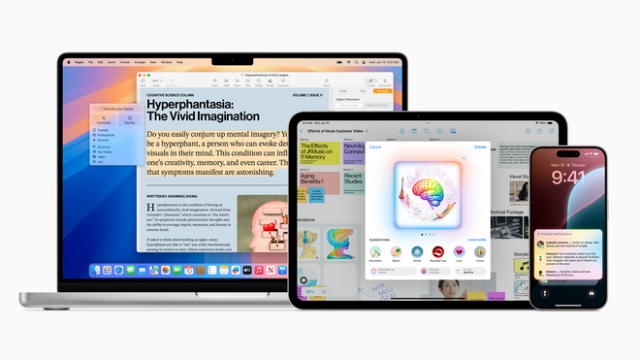Apple Intelligence reportedly still very finicky in internal testing

Apple Intelligence — the personal intelligence system for iPhone, iPad, and Mac — combines the power of generative models with personal context to deliver intelligence that’s useful and relevant to the user.
Apple on Monday introduced Apple Intelligence, the personal intelligence system for iPhone, iPad, and Mac that combines the power of generative models with personal context to deliver intelligence that’s incredibly useful and relevant. Apple Intelligence is deeply integrated into iOS 18, iPadOS 18, and macOS Sequoia. It harnesses the power of Apple silicon to understand and create language and images, take action across apps, and draw from personal context to simplify and accelerate everyday tasks. With Private Cloud Compute, Apple sets a new standard for privacy in AI, with the ability to flex and scale computational capacity between on-device processing and larger, server-based models that run on dedicated Apple silicon servers.
Apple is integrating ChatGPT access into experiences within iOS 18, iPadOS 18, and macOS Sequoia, allowing users to access its expertise — as well as its image- and document-understanding capabilities — without needing to jump between tools.
Siri can tap into ChatGPT’s expertise when helpful. Users are asked before any questions are sent to ChatGPT, along with any documents or photos, and Siri then presents the answer directly.
Additionally, ChatGPT will be available in Apple’s systemwide Writing Tools, which help users generate content for anything they are writing about. With Compose, users can also access ChatGPT image tools to generate images in a wide variety of styles to complement what they are writing.
Privacy protections are built in for users who access ChatGPT — their IP addresses are obscured, and OpenAI won’t store requests. ChatGPT’s data-use policies apply for users who choose to connect their account.
ChatGPT will come to iOS 18, iPadOS 18, and macOS Sequoia later this year, powered by GPT-4o. Users can access it for free without creating an account, and ChatGPT subscribers can connect their accounts and access paid features right from these experiences.
Mark Gurman for Bloomberg News:
At Apple Inc.’s Worldwide Developers Conference on Monday, the company showed the results of its mad scramble to build a sophisticated new platform: Apple Intelligence.
The frenzied effort to create Apple Intelligence began in late 2022, when it became obvious that generative AI would take the world by storm. Until that point, Apple’s lack of progress in artificial intelligence technology hadn’t been an issue for investors or consumers. But it was suddenly clear that the brand would suffer if Apple didn’t have a more aggressive AI strategy soon.
After ChatGPT and other AI tools arrived, Apple had no choice but to rework iOS 18, its latest iPhone operating system, to include as much AI as possible.
So, in roughly a year and a half, Apple concocted an entirely new AI platform that today remains a work in progress. The features will launch as a public beta test later this year, and it may be a rocky stretch to get to that point. Apple Intelligence is still so finicky in internal testing that some features have been stripped out from the version headed to developers.
Apple also swallowed its pride and added OpenAI’s flagship chatbot, rather than waiting for its own technology to be ready years later… But the company may still be getting ahead of itself. Many of the features unveiled during the event won’t be available until next year.
Support MacDailyNews at no extra cost to you by using this link to shop at Amazon.
MacDailyNews Take: After the last 12-18 months of frenzied rowing to catch up to rivals after missing the boat, those Apple employees who are working on Apple Intelligence are set for a busy summer! This is the direct result of going for so long – too long! – without having a visionary in the CEO chair.
Of course and as usual, we were the first to tell you all of this was happening at Apple, months ago:
Apple was caught flat-footed, due to a lack of vision on the part of leadership. They were, uh, focused elsewhere. Apple’s traditional data center network is not fit for generative AI. It will take years and billions of dollars to catch up just to where GenAI leaders (OpenAI, Microsoft, Alphabet, etc.) are today.
So, the only solution is to partner with a [Google, OpenAI, Baidu, etc.] for the real GenAI stuff while pretending (marketing) really hard that some on-device AI Apple has whipped up in a few months is “insanely great Apple innovation” that’s at the heart of Apple’s 2024’s AI announcements when it’s really just an adjunct… Watch Apple make a big show of its on-device AI at WWDC and run many ads touting it from June onwards.
Apple hopes to buy time for the data center buildouts and investments that will be required for them to someday own their own AI technology and not have to license it from the likes of [OpenAI].
This is what happens after a decade plus with a caretaker CEO at the helm after he hits the last page of his iteration playbook, yet attempts to stay in the game for too long.
See also:
• Work on Apple Vision Pro began under Steve Jobs – August 23, 2023
• Contrary to popular belief, Steve Jobs knew about Apple Watch – February 13, 2023
Please help support MacDailyNews. Click or tap here to support our independent tech blog. Thank you!
Support MacDailyNews at no extra cost to you by using this link to shop at Amazon.
The post Apple Intelligence reportedly still very finicky in internal testing appeared first on MacDailyNews.


